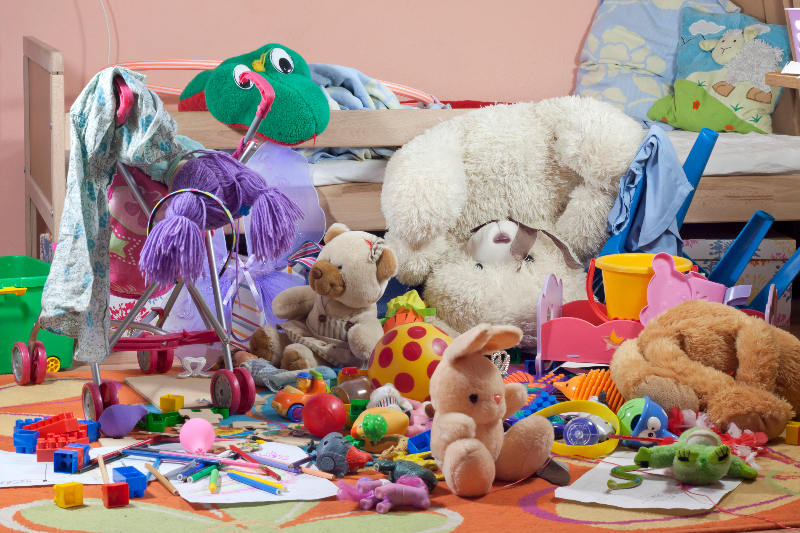
 Image credit: Deposit Photos. Licensed by author. All rights reserved.[/caption]
It’s not just the pile of shoes by the front door or the mound of dirty clothes next to (not in) the laundry basket.
It’s more than the distractability and the chores half completed in the most harried, haphazard way.
It’s not just the missing homework, lost school books, or academic fights and avoidance.
It’s all of it, really, plus the messy rooms ...
the nagging to get dressed ...
the constant requests to be nice, stop climbing the furniture, and quit acting like a wild animal.
If cleanliness and appropriate behavior are next to Godliness, you figure your family ought to get to confession -- fast.
My friend, I know what you’re thinking. That somehow, you haven’t formed your kids well enough in virtue or in life. That their lack of organization, impulse control, and ability to prioritize is a character flaw you’ve either passed down to them or exhibited via example.
Truth is, neither of those assumptions is right.
Image credit: Deposit Photos. Licensed by author. All rights reserved.[/caption]
It’s not just the pile of shoes by the front door or the mound of dirty clothes next to (not in) the laundry basket.
It’s more than the distractability and the chores half completed in the most harried, haphazard way.
It’s not just the missing homework, lost school books, or academic fights and avoidance.
It’s all of it, really, plus the messy rooms ...
the nagging to get dressed ...
the constant requests to be nice, stop climbing the furniture, and quit acting like a wild animal.
If cleanliness and appropriate behavior are next to Godliness, you figure your family ought to get to confession -- fast.
My friend, I know what you’re thinking. That somehow, you haven’t formed your kids well enough in virtue or in life. That their lack of organization, impulse control, and ability to prioritize is a character flaw you’ve either passed down to them or exhibited via example.
Truth is, neither of those assumptions is right.
Difficulty with Executive Function is Not A Character Flaw
You are facing difficulties with executive function, the series of mental processes that organize the mind, the body, and one’s personal space. It’s neither a character issue nor a skill that can be taught or improved upon. You’re either born with it, or you aren’t wired that way. How do I know this? Well, I’m raising three twice-exceptional kids. When God wired their brains in utero, He didn’t include executive function skills. Instead, God gave them creativity. He gave them the ability to absorb and process information at a high rate of speed. He gave them high sensitivity, quick wit, great empathy, and a strong sense of righteousness. And they are absent-minded professors who forget to go to the bathroom, need reminders for basic hygiene, and can’t organize their way out of a paper bag.What Are Executive Function Skills?
Over the years and through all the research I’ve done, I’ve learned that executive function skills are an integral part of human behavior. They impact everything from an individual’s ability to initiate, sustain, and complete a project to their ability to exhibit self-control. While it’s not an excuse or reason to abandon personal responsibility, learning about executive function does help us understand the problem behaviors our kids experience. It helps us help our children develop better strategies -- So when they grow up, we don’t have to worry about them losing our grandkids (or the members of their parish, or the keys to the convent, or…) Executive function difficulties are not uncommon, and there were saints who either lived it or understood the struggle quite well. St. Maximilian Kolbe is known for his devotion to Our Lady, his charity, and his brilliance as a journalist - not his organizational skills. St. Benedict seemed to be quite familiar with the topic also, and while I don’t think he had difficulty with it himself, he did seem to see how it impacted other people around him. How else would we have gotten his Rule of Life? Fortunately for us, we have St. Benedict’s example to follow. We can, in a way, create our family’s own rule of life. We can develop and implement external strategies that shore up executive function skills similar to the way a scaffold supports a work in progress. While we can’t cultivate executive function in children who don’t have it, we can provide concrete support to foster appropriate life skills.How to Support Your Child’s Executive Function
For impulse control, try role play. Practice social situations in which they might flounder and discuss how to navigate the circumstances. You can also use social stories to show appropriate behavior and responses to a number of situations. Can’t find one you like? Make your own with paper and pen. For forgetfulness, use concrete, visual reminders. Printable schedules like these are super handy and perfect for helping children who struggle with routine. Give them detailed instructions about what they are supposed to do and in what order they should do it. Then they can check it off their list and move on to the next part of their day. For procrastination, use timers and token economies. For disorganization, label everything and use photos. Help your child clean their personal spaces one time, then photograph once it is done. Post those images in their room as a reminder of what the space should look like. Include detailed verbal directions like these next to the photos, too. The more outside support you can offer, the more likely these techniques will become second nature to your kids. Your home will be more peaceful, more organized, and more of a refuge than an unmitigated disaster. The right strategies will go a long way toward helping all of you re-order your heads, your hearts, and your home.Copyright 2019 Ginny Kochis
About the Author

Ginny Kochis
Ginny Kochis is a Catholic wife and homeschooling mom to three differently-wired children. She founded the Not So Formulaic community to support Catholic moms raising out-of-the-box kids. Ginny believes God gives curious, creative, intense children the exact mother they need to thrive.


.png?width=1806&height=731&name=CatholicMom_hcfm_logo1_pos_871c_2728c%20(002).png)
Comments